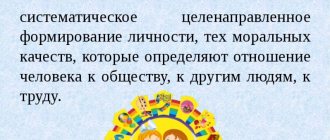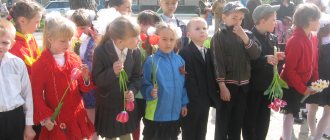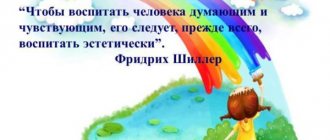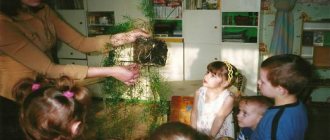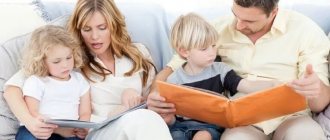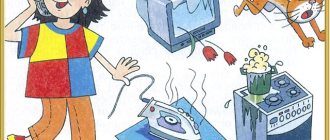Big things start small
The head of the nursery-kindergarten, Marina Ivanovna, who has been working in this educational institution for more than 30 years, admits that she always showed interest in the economic education of children, almost from the first days of working as a teacher: she played games with children in this direction, drew the attention of preschoolers to saving light, water and heat, developed primary ideas about money.
And since 2015, the pedagogical project “Economics for Children or Economic Education of Preschool Children as a Factor in Personal Socialization” has been implemented in the nursery-kindergarten.
Skeptics will say: the economy and preschoolers are too far apart. But don't rush to conclusions. Any big business starts with little things. So you can’t approach economics without mastering the fundamentals of this science. Children must understand that in order to get money out of their pocket, they must first put it there.
To be successful in life and profession, you need to be economically literate - and hardly anyone will argue with this. Familiarization with the basics of this science should begin already in the first link of the education system - a preschool institution, because children’s economics and the first ideas about money and its purpose begin to form at the age of 4-6 years. Understanding these basic principles became the starting point for the kindergarten administration when implementing a project on economic awareness of preschoolers.
The sown grain is already sprouting. During the implementation of the project on economic awareness of preschoolers, and this is already two years, educators note that the children have developed an economic outlook, the pupils have mastered basic economic skills, easily operate with basic concepts of the financial sphere and even distinguish between emotional relations and commodity-money relations.
Of the six kindergarten groups, the project covers two middle and one senior (children over 4 years old). The work of the entire team is aimed primarily at making economics interesting for children and making classes fun and useful.
The “pickled cucumber” principle
The entire project is designed for three years. Next year it will end, but the idea of frugality, which seems to permeate even the air in kindergarten, is sure to remain.
Here we can safely talk about the famous “pickled cucumber” principle of V. F. Shatalov, an innovative teacher, people's teacher of the USSR, who actively introduced this method in his teaching practice.
He argued that such an environment must be created around the child so that he can contain knowledge within himself, like a cucumber in a jar of pickle.
If the environment is good, then the result will be the same. And it doesn’t matter what size the cucumber is in the brine, sooner or later it will become salty.
So it is here: the economy is at every step, it is in everything, in every movement. Through games, fairy tales, plays, musicals, conversations, activities, and observations, children learn the basics of this seemingly complex science.
5) Think about what sectors of the economy work so that we can drink a glass of milk in the morning
So that we can drink a glass of milk in the morning:
- Animal husbandry . Cows give milk.
- Packaging industry. The milk is packaged in factory-made containers.
- Transport. Milk is delivered to retail outlets.
- Trade. Milk is on sale.
- Mechanical engineering. A refrigerator is being manufactured.
- Glass industry. A glass for milk is being made.
Economics for children - game methods
Children are actively involved in role-playing and didactic games, the purpose of which is to form a caring attitude towards the world around them, as well as to teach children to use both finances and natural resources wisely.
An example of one of these games. A card is placed in the center, which shows, for example, the family budget, and children are asked to think about what they will buy first:
- one is looking for a shopping card,
- the other goes to pay the rent,
- and someone, first of all, finds a card with a picture of the sea.
This is how children learn to set financial priorities.
Economic concepts for children
But economics is inextricably linked with such not entirely pleasant concepts as “greed”, “greed”, “profit” and “waste”. In words, children have difficulty perceiving new concepts, but if they are figuratively presented in the form of textile ugly and even ugly dolls, whose names are Fekla Zhadnaya and Mikhail Tranzhyra, then rest assured that children will remember them forever.
Older students are also familiar with such concepts as “world money” and “advertising”. Together with their parents, kindergarten teachers organized a world money bank, where the currencies of other countries, as well as the single monetary unit of the European Union countries, are clearly demonstrated to children. In order for preschoolers to remember the products of enterprises in their city and country as a whole, teachers made stickers with the symbol of their city and country on the packaging of fake products.
If we invite our children to make a product with their own hands - sculpt it, make it from a construction set, or draw a picture, and then come up with an advertisement for their product, then we will see what kind of smart economists and marketers our students can make in the future. Children are able to highlight only the most valuable characteristics of their product and will convincingly prove that it is the best and necessary in the household.
A story about the livestock industry according to plan for grade 2
- Animal husbandry.
- Produces meat, milk, cheeses, sausages, eggs, wool, honey.
- Provides people with food and clothing.
- The industry employs livestock breeders, veterinarians, milkmaids, shepherds, beekeepers, livestock specialists, horse breeders, poultry farmers and many others.
A story about the trade industry according to plan for 2nd grade
- Trade.
- Provides services for the sale of food, industrial and other household goods to the public.
- Provides communication between product manufacturers and buyers.
- The industry employs salespeople, cashiers, managers, loaders, stackers, sorters, and consultants.
A story about the industry according to plan for grade 2
- Industry.
- Produces various industrial goods: steel, rolled products, machinery and equipment, household appliances, cars, electronics, raw materials and much more.
- Provides industrial goods and services other sectors of the economy.
- The industry employs metallurgists, machine builders, miners, oil workers, mechanics, assemblers, welders, and power engineers.
Children helping parents: planning a budget together
Adults often block children, especially preschoolers, from participating in the economic life of the family, believing that they should not bother a child with money problems. And then they themselves are surprised that their daughter or son doesn’t know anything, doesn’t value money, and are worried about how he will live on his own.
Often in a store you see the following picture: a child persistently asks to buy him candy. The parents’ answer, as a rule, is short: “It’s expensive,” “You don’t need it.”
Lack of experience in distributing family income and lack of involvement in the implementation of the family budget leads to the fact that in the future some young people tend to overestimate their own knowledge of preparedness for life.
Although it’s easy, standing in front of the counter with your child, to find a minute of your time and tell them that 1 ruble is less than 2, and a banana will bring more benefits than a chocolate bar, and it’s cheaper...
Economic awareness begins from these seemingly simple steps for an adult.
The activities of parents, their attitude towards money and things are learned especially strongly by children.
Parents have to solve problems related to various economic activities on a daily basis. It is necessary to make it a rule to invite your children to plan and implement these tasks. Then it will be easier for them to imagine their upcoming independent life, financial planning and work activity.
To do this, parents must distribute household responsibilities, including among children, think through the daily routine together with them, and decide together what the family income consists of and where financial resources are spent.
LiveInternetLiveInternet
Saturday, May 03, 2014 03:06 + in the quote book nata_tursha
all entries by the author (excerpt).
Tatyana Popova, Olga Menshikova, Larisa Knyshova Dear mothers, fathers, grandparents! You all know what difficult times we live in. How many new and unfamiliar things have appeared around! Processes, phenomena, concepts that we had never thought about before: inflation, joint stock company, share, capital, broker, manager, investment, and so on and so forth. How can you help your child not to drown in this flow of information? How to tell what is bad and what is good? How can I help him not to get confused, to resist and find his place in life when he grows up? We, the authors of this book, believe that economic knowledge is as necessary for our children as basic knowledge of hygiene, rules of behavior in society and traffic rules, as important as knowledge of their native speech and mathematics. This does not mean that everyone should become an economist or work in business in the future. Against. We believe that every child should develop their individual creative abilities. But in order to fully realize these abilities, he must be well oriented in the life around him. And without knowledge of economics it is very difficult to do this. In our opinion, the formation of economic thinking in children can and should begin from preschool age. At this time, kids are most receptive to new knowledge, especially if it is presented in a playful way. Surely your child has already asked questions related to economic problems in one way or another. Were you always able to answer them correctly and clearly? Remember that this should be done not through direct teaching, but through games, special radio and television programs, favorite cartoons and books. But the main role in this process belongs to you, dear adults. I would like this book to be your first assistant. The best way to work with a book is family reading. Sit next to your baby and read together. Check how your child understands each story from the book, how he answers questions and completes tasks. If possible, explain what you read using examples of your profession, your business. Maybe this will help you learn and understand something necessary and important, or take a fresh look at your life. Please note the definitions given under the heading “Adults Only!” They will help you navigate the economic concepts presented in the book and explain to your child what may seem difficult to him. At the same time, try not to impose your opinion on the child and do not deprive him of the opportunity to think independently. We hope that reading the book will serve as an impetus for thinking not only on economic topics. Let your son or daughter think about why money and savings are needed. And is it worth making money as an end in itself? Discuss with your child what you shouldn’t spare money on and why (sports, travel, visiting theaters and exhibitions, buying books, gifts for family and friends, organizing and holding holidays, etc.). Try to make your child understand: happiness is not only receiving, but also giving, giving joy to the people around you. And let your baby be happy! STORY ONE
How Misha turned from a buyer into a seller
About where you need to start if you want to organize your own business, and how to determine what is most important in this business
One day, waking up after winter hibernation, Misha crawled out of his favorite den and saw I couldn’t believe it: there was such beauty all around – it was simply breathtaking!
The whole forest stands as if washed, shimmering with all the colors of the rainbow in the rays of the gentle March sun. The branches of birch, pine, and spruce trees stand out so clearly against the background of the shining blue sky that it seems as if they were painted by the artist’s masterful hand and serve as the backdrop for a fairy-tale performance in which everything is magical: this forest, and the sky, and the white, white snow, from which, if you look at him for a long time, you close your eyes... All day Misha sledded, tumbled in the snow, and this is the result: by the evening he had a sore throat. We urgently need tea with raspberry jam and hot milk! But there was none of this in the den. Misha wandered to the forest market, and there was no one there - he arrived late. Misha ran to the store to visit Winnie the Pooh - and there was no luck, there was a note on the door: “He went to his native forest for Eeyore’s birthday.” “Eh,” Misha was upset, “if I had my own store, there would be plenty of everything.” And he decided to open his own store. No sooner said than done. The next day, early in the morning, Misha, although he still didn’t feel very well, swept the den clean, set up a counter in the middle, placed cast iron scales found in a forest dump on it, and sat down importantly to wait for customers. Zaychik, the grandson of the old Hare, came to see Misha. - Aren’t you going to play in the snow? “I can’t, I’m now the owner of the store.” You see, I'm trading. - Are you trading? What are you trading? Misha scratched the back of his head, but there was nothing to answer and nothing to trade. The bunny stood and stood, shrugged his shoulders and ran away. Misha is upset and almost cries. He began to think and wonder: why isn’t anything working out for him? I thought and thought and finally realized that the main thing in a store is not the scales, not the counter, or even the salesperson, but what they sell - the PRODUCT. FOR ADULTS ONLY! A product is a product of labor produced for sale. [/td]
Misha ran around the den, looking for something to put on the counter. I found a rubber ball with holes and wanted to put it on the counter, but I realized in time: who needs such old stuff? I thought about selling my fur coat, but the fur coat would come in handy. And Misha remembered that he had several barrels of honey hidden in the far pantry. What could be tastier and healthier than honey for any forest dweller! Misha rolled out five barrels from the pantry, placed them on the counter and sat down to wait for customers. He looks at the honey and thinks: “Strange thing! When I collected honey in the forest, it was just honey from wild bees. When the honey was in the pantry, it was just honey from a thrifty little bear.” Misha licked his lips and began to think further: “And as soon as I put the barrel of honey on the counter, it became not just honey, but a commodity. This means that a product is something that can be bought and sold.” But then Misha’s thoughts were interrupted by a new guest - the Hedgehog. He bought a jar of honey for his beloved old grandfather. This is how trading began in Misha’s store. And soon on the counter of this store there were not only barrels of fragrant honey, but also many other delicious goods. Where did Misha get them? You will learn about this in the next story. And now we invite you to look into one very smart book, which was given to the aspiring businessman Misha by the wise Owl, who learned the news about the opening of a store from the forest gossip Soroka. He said that this book, although it is boringly called “Problem Book,” will help Misha (and you too) acquire new knowledge in the field of economics. PROBLEM OF THE WISE Owl 1. Guess the riddle:
Guess what it’s called, What is sold for money.
This is not a wonderful gift, but simply... 2. Remember the fairy tale
by the Brothers Grimm “King Thrushbeard” - about a capricious princess who had to sell pots at the market.
What can you call these pots? 3. Look carefully at the drawing
and tell me with a pencil what you can buy? Think about why not everything can be bought and sold. What do you think is not yet being bought or sold? Discuss this with adults. or Read on the Source website
Series of messages “Economics for kids”:
Part 1 - Economics for kids, or How Misha became a businessman Part 2 - Interesting observation of his day. Part 3 - Interesting observation of the day. Financial literacy from childhood. ... Part 9 - Library: Economic toy library Part 10 - Pocket money for children: to give or not to give? Part 11 - Basics of financial literacy from childhood.
Tags:
children development training economics for children kids how to become a businessman
Cited 6 times Liked by: 1 user
Like share
0
Like
- 1
I liked the post - Quoted
- 0
Saved
- Add to quote book
- 0
Save to links
Liked1
0
Forms of work with parents on the economic education of children
In the nursery-kindergarten, various forms of work with parents are used.
Economics for children means economic conversations, classes, business games, consultations, parent meetings, poster information, and even a game of KVN with the participation of moms and dads.
A series of developing cartoons “Auntie Owl's ABC of Money” is offered to parents.
Joint viewing of the lessons “Caution: Money!”, “Loans and Deposits”, “Ability to Save”, “Needs and Opportunities” teaches children how to manage money independently, helps them understand the concept of “family economic security”, and tells them how to curb their needs.
Practice shows that many parents do not need economics for their children at all, and economic education ends with the phrase “Money doesn’t grow on trees.” But financial awareness isn't just talk, it's real action. Children need to see clear examples, otherwise they may not expect results.
Various business games together with parents will provide some help in understanding the secrets of the family budget. Moms and dads are also asked not to forget about such an important point as money-related errands: go to the store, buy groceries yourself and bring back the rest. This is an important and turning point for every child - if he sees that he is trusted!
How to interest a child?
In the nursery, they do not forget about the most important component: in order to teach a child anything, it is necessary to interest him. And children are primarily interested in games and fairy tales. This was the focus of the institution. The students even staged an economic musical, where a sly fox did not want to prepare for winter and spent all the money on a new fur coat. The wolf, on the contrary, approached the issue of wintering thoroughly: he replaced the radiators in the house, installed double-glazed windows, and insulated the walls. So the children clearly explained who ended up in better conditions.
Today, parents proudly share pleasant observations: children began to make sure that they do not turn on the lights in the house in vain, turn off the water tap, when distributing the family budget, determine what is primary and what is secondary, and pay attention to prices in the store.
These are the basic concepts of economics for children, economic skills for preschoolers. Then this knowledge will become a confident basis for more important economic skills.
What is financial literacy?
Financial literacy is the knowledge, skills and abilities that a person needs to make smart financial decisions, as well as to achieve financial well-being.
A financially literate person is a person who:
- knows how to competently handle funds, preserve and increase them;
- keeps records of income and expenses;
- navigates the economic situation of the country;
- can recognize signs of financial fraud;
- fulfills its obligations as a taxpayer;
- knows how to navigate banking services.
For a long time, it was believed that financial literacy was necessary only for employees of financial institutions. But a 2017 survey by the National Financial Research Agency found that people are increasingly complaining about a lack of economic and financial knowledge that would help them, for example, avoid taking part in dubious financial transactions. And only 12% of respondents believe that they have a sufficient level of financial awareness.
Therefore, our country is now actively pursuing a policy to increase financial literacy among the adult population and the younger generation. Special literature is published for children, and economic games and applications are created. Information sites and online courses on personal finance management are intended for adults.

